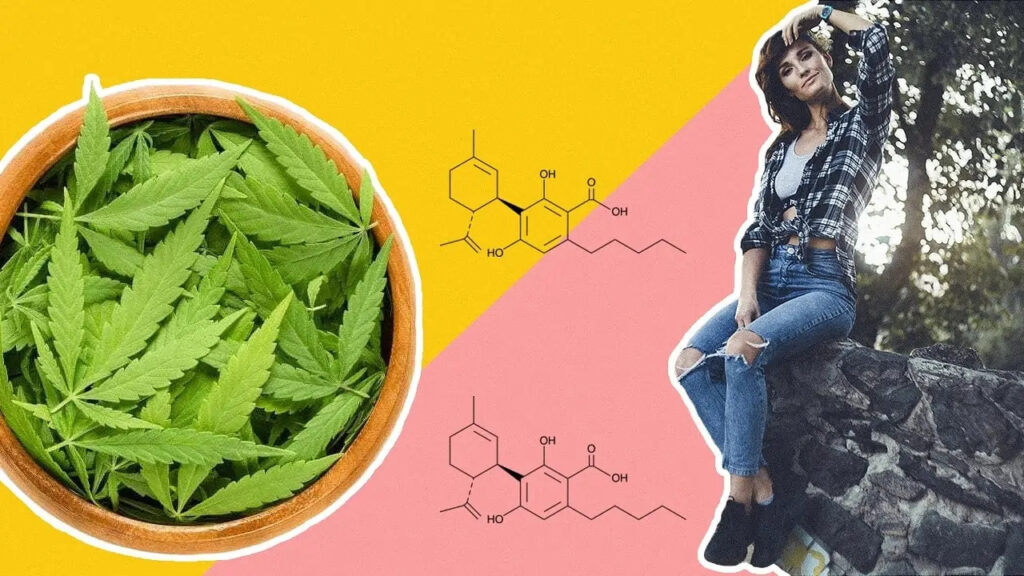
The Significant Effect of Adding CBDA into your Health and Wellness Routine
CBD has been growing in popularity since the 2018 Farm Bill that legalized cannabinoids derived from hemp, as long as they have 0.3% or less of Delta-9-THC. In fact, 1 in 7 adults currently use a CBD product for their health and wellness. But what about its precursor CBDA? CBDA recently became available in a stable form, bringing more products to the market for consumers to enjoy. It is a minor cannabinoid that when added into your daily routine can make a major impact, even more so than CBD! Let’s dive into what CBDA is and the many benefits it can deliver.
What is CBDA?
CBDA is the precursor to CBD. This means when CBDA is decarboxylated, a process where cannabinoids are exposed to heat, it converts to CBD. Traditional extraction methods that utilize ethanol and butane use heat in the extraction process, causing a majority of the acidic cannabinoids to convert before the final extract is made. Due to the vast number of therapeutic benefits CBDA has demonstrated through research and growing consumer interest, global solution providers are finding ways to extract acidic cannabinoids, such as CBDA and CBGA, without the use of heat; allowing them to extract CBDA at a mass scale.
What are the benefits of CBDA?
Though CBDA has been less researched compared to other cannabinoids, current and emerging research shows it has great therapeutic potential to help with an array of ailments. Here are some of the many benefits of CBDA:
- Anti-Inflammatory
- Reduces pain and hyperalgesia
- Anti-Seizure
- Anti-Anxiety
- Anti-Depressant
- Reduces nausea and vomiting
Additionally, CBDA was recently propelled into the media spotlight, along with CBGA, from a discovery in a 2022 Oregon State University study. Researchers were examining the acidic cannabinoids effects of the SARS-Cov-2 virus. It was found that when CBDA and CBGA were introduced to the cells in vitro, CBDA and CBGA prevented the virus that causes Covid-19 from entering the cells by binding to the spike protein. This same type of action has also help patients with HIV and hepatitis and warrants the need for immediate continued research on this topic.
Is CBDA better than CBD?
Is CBDA better than the well-known CBD? In many ways, yes! Research has demonstrated CBDA has many advantages to CBD, and we can even use less CBDA for the same therapeutic effects! Let’s read what research has to say about CBDA’s many advantages.
Higher Bioavailability
A study published in the 24th Annual Symposium of the International Cannabinoid Research Society found CBDA is 19x more bioavailable than CBD! What exactly does this mean for consumers? This means our bodies absorb more CBDA in comparison to CBD when taking an equivalent dose, allowing for lower doses of CBDA for the same therapeutic effect for a variety of instances.
Additionally, a patent filed from GW Pharma found CBDA was more effective at treating seizures than CBD and accredited the findings to CBDA’s higher bioavailability. It was found patients would need much lower doses of CBDA in comparison to CBD to stop their seizures. GW Pharma is the maker of Epidiolex, an FDA approved drug with a fixed ratio of CBD for seizure disorders and is now looking to create a CBDA version that will be even more effective for patients suffering from a variety of seizure disorders.
Greater Affinity to Receptors
CBDA has a greater affinity to the body’s serotonin or 5-HT1A receptor. The receptor is most recognized for its role in controlling mood. However, it is responsible for modulating dozens of processes in the body including pain signals, nausea and vomiting, as well as the cardiovascular system. Through research, CBDA has demonstrated a 100-fold greater affinity to the receptor when compared to CBD, allowing for lower doses of CBDA in a variety of instances and also showing CBDA as a greater therapeutic. Some instance that CBDA would benefit the body more include, reducing anxiety and depression and combating chemotherapy induced nausea.
What products have CBDA in them?
With CBDA only recently available in a stable form to infuse into cannabinoid-based applications, there is a lack of products with CBDA on the market for consumers. Additionally, very few global solution providers can extract CBDA at a mass scale, leaving only trace amounts in the majority of products available. If you are looking to get the benefits of CBDA for yourself, here are a few products to look for:
Full Spectrum and Broad Spectrum
Full spectrum cannabinoid products contain all the naturally occurring cannabinoids within the hemp plant, including Delta-9-THC. For legal reasons, all products must have 0.3% or less of Delta-9-THC. Broad spectrum products contain all the naturally occurring cannabinoids, except THC, making it ideal for those who cannot ingest THC, but still want to feel the effects of multiple cannabinoids. Most likely these products will have CBDA. However, it is best to always check lab testing to be sure. Some manufacturers use heat in the process of making their products, causing acidic cannabinoids to convert, leaving trace amounts in the final product.
It is important to note, though many inhalation products, such as flower and vapes, are labeled CBDA; they are not. When CBDA is heated, it converts to CBD. So even though the preroll claims to have CBDA, the minute it ignites, it converts. It is best to look for tinctures, lotions, beverages, edibles, and any other cannabinoid products you do not have to heat to use. Additionally, always check the COA (certificate of analysis) to ensure you are getting CBDA. And lastly, enjoy the many benefits CBDA has to offer.





More Stories
Is Vaseline an Indian Company? True or Not
Hrms Login Medicover – Tips and General Step to login
wheonx health: Latest Health News Portal